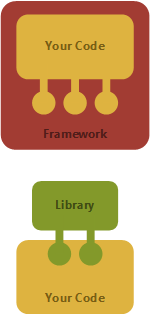Library patterns: Why frameworks are evil

This article is a follow up to my previous blog post about functional library design, but you do not need to read the previous one, because I'll focus on a different topic.
In the previous article, I wrote about a couple of principles that I find useful when designing libraries in a functional style. This follows from my experience with building F# libraries, but the ideas are quite general and can be useful in any programming language. Previously, I wrote how multiple layers of abstraction let you build libraries that make 80% of scenarios easy while still supporting the more interesting use cases.
In this article, I'll focus on two other points from the list - how to design composable libraries and how (and why) to avoid callbacks in library design. As the title suggests, this boils down to one thing - build libraries rather than frameworks!
Published: Tuesday, 3 March 2015, 5:13 PM
Tags:
f#, open source, functional programming
Read the complete article
Library patterns: Multiple levels of abstraction

Over the last few years, I created or contributed to a number of libraries including F# Data for data access, Deedle for exploratory data science with C# and F#, Markdown parser and code-formatter F# Formatting and other fun libraries such as one for composing 3D objects used in my Christmas blog post.
Building libraries is a fun and challenging task - even if we ignore all the additional things that you need to get right such as testing, documentation and building (see my earlier blog post) and focus just on the API design. In this blog post (or perhaps a series), I'll share some of the things I learned when trying to answer the question: What should a good library look like?
I was recently watching Mark Seemann's course A Functional architecture with F#, which is a great material on designing functional applications. But I also realised that not much has been written on designing functional libraries. For some aspect, you can use functional patterns like monads (see Scott Wlaschin's presentation), but this only answers a part of the question - it tells you how to design individual types, but not an entire library...
Published: Tuesday, 3 February 2015, 4:54 PM
Tags:
f#, open source, functional programming
Read the complete article
Building great open-source libraries

The hard part about successful open-source development is not putting the first version of your source code on GitHub. The hard part is what comes next. First of all, there are community aspects - making sure that the project fits well with other work in the area, engaging the community and contributors, planing future directions for the project and so on. Secondly, there is an infrastructural side - making sure that there is a package (on NuGet in the F# world), easy to run and useful tests and also up-to-date documentation and tutorials.
In this article, I want to talk about the infrastructural side, which is easier of the two, but nevertheless, difficult to get right! Fortunately, the F# community made an amazing progress in this direction, so let's have a look at some of the tools that make this possible...
Published: Thursday, 31 October 2013, 2:29 PM
Tags:
open source, f#, fake, f# formatting
Read the complete article
F# Data: New type provider library

When F# 3.0 type providers were still in beta version, I wrote a couple of type
providers as examples for talks. These included the WorldBank type provider
(now available on Try F#) and also type provider for
XML that infered the structure from sample.
For some time, these were hosted as part of FSharpX
and the authors of FSharpX also added a number of great features.
When I found some more time earlier this year, I decided to start a new library that would be fully focused on data access in F# and on type providers and I started working on F# Data. The library has now reached a stable state and Steffen also announced that the document type providers (JSON, XML and CSV) are not going to be available in FSharpX since the next version.
This means that if you're interested in accessing data using F# type providers, you should now go to F# Data. Here are the most important links:
Before looking at the details, I would like to thank to Gustavo Guerra who made some amazing contributions to the library! (More contributors are always welcome, so continue reading if you're interested...)
Published: Thursday, 28 March 2013, 3:23 AM
Tags:
open source, f#, f# data, type providers
Read the complete article
Announcing: Literate programming tools for F#

For some time now, I've been writing my F# blog posts (and other F# articles published elsewhere) by combining F# code snippets and Markdown formatting. In fact, I even wrote a Markdown parser in F# so that I can post-process documents (to generate references etc). You can read about the Markdown parser in an upcoming F# Deep Dives book - currently, it is available as a free chapter!
During the Christmas break, I finally found enough time to clean-up the code I was using and package it properly into a documented library that is easy to install and use. Here are the most important links:
- F# Formatting home page
- F# Formatting source code on GitHub
- F# Formatting package on NuGet
To learn more about this tool and how to use it, continue reading!
Published: Tuesday, 22 January 2013, 5:35 PM
Tags:
open source, f#, writing, literate
Read the complete article